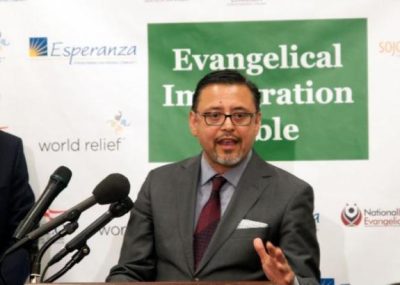Economic Impact
Immigrants are essential to the U.S. economy, filling roles from high-skilled tech sectors to agricultural labor and driving economic growth. They also contribute to the tax base and consumer spending. We champion reform that will maximize this effect and create a more diverse and competitive workforce.

How the President’s Deferred Action Initiative Will Help the U.S. Economy
President Obama’s June 15 “deferred action” announcement is good not only for the 1.4 million unauthorized children and young adults who have been granted a temporary reprieve from deportation, but also good for the U.S. economy. Each year, tens of thousands of unauthorized students graduate from primary or secondary school, often at the top of their classes. They have the drive and intelligence to become doctors, nurses, teachers, and entrepreneurs, but their lack of legal status has prevented them from attending college or working legally. The President’s deferred action initiative has finally provided them with an opportunity to live up to their full potential and, in the process, earn more, spend more, and pay more in taxes. Read More

Economic Benefits of Granting Deferred Action to Unauthorized Immigrants Brought to U.S. as Youth
There are an estimated 1.4 million children and young adults in the United States who might benefit from President Obama’s announcement that the Department of Homeland Security would begin granting deferred action (and Employment Authorization Documents) to unauthorized immigrants who were brought to the United States as minors. For many of these young people, the United States is the only home they know and English is their first language. Each year, tens of thousands of them graduate from primary or secondary school, often at the top of their classes. They have the potential to be future doctors, nurses, teachers, and entrepreneurs, but their lack of legal status has prevented them from attending college or working legally. The President’s deferred action initiative will provide an opportunity for them to live up to their full potential and, in the process, make greater contributions to the U.S. economy. Read More

New Data Reveals Immigrants’ Voting Potential at the Local Level
Newly obtained data from the DHS Office of Immigration Statistics provide another indication that immigrants in the United States hold untapped electoral power. There are 8.1 million legal immigrants who arrived in this country between 1985 and 2005 and who are likely eligible to become naturalized U.S. citizens with the power to vote. If these immigrants were already U.S. citizens, and if they registered to vote at the same rate as other naturalized citizens (61%), counties across the nation would see their voter registration rolls jump dramatically. Read More

Even a Fifth Grader Realizes the Power of the American Dream
Shortly after President Obama announced that DHS will halt the deportations of eligible undocumented youth, a Chicago-area fifth grader delivered a speech of his own. Over the weekend, Alexander Tymouch was honored as the National 5th Grade Creative Writing Contest winner at the American Immigration Council’s Annual Benefit Dinner where he read his essay, “America, the Magical Land,” alongside Grammy-nominated musicians at the Gaylord Opryland Hotel in Nashville. Read More

Public Education for Immigrant Students: Understanding Plyler v. Doe
This fact sheet provides an overview of the Supreme Court’s decision in Plyler v. Doe and subsequent efforts by states and localities to avoid compliance with the decision. Read More

Immigrant-Owned Small Businesses Contribute More to Economy Than You’d Think
In the never-ending debate over the impact that immigration has on the U.S. economy, the role of immigrant small businesses usually goes unnoticed. While mention is sometimes made of the fact that two in five Fortune 500 companies were founded by immigrants, the little businesses—the majority that employ under 100 people—are often forgotten. In large part, this is due to the absence of basic data on the subject. However, a new report from the Fiscal Policy Institute (FPI) finally quantifies the value of immigrant small businesses to the U.S. economy. Read More

Even Evangelicals Agree: Congress Needs to Take Action on Immigration
DREAM Act students, immigration advocates and community leaders have turned up the heat on Congress and the Obama administrative in recent weeks to do something, anything, about our nation’s immigration problems. Yesterday, Evangelical leaders—including the National Association of Evangelicals, and Focus on the Family—joined that effort, denouncing recent “self-deportation policies” and calling on leaders to break the gridlock on immigration. Read More

Fatally Flawed: FAIR Blames Immigrants and Children for Maryland’s Financial Problems
In a case of very creative accounting, the nativist Federation for American Immigration Reform (FAIR) is blaming immigrants and children for Maryland’s fiscal woes. In a new report, FAIR lumps together unauthorized K-12 immigrant students with U.S.-born students who have unauthorized parents and claims that they are all costing Maryland taxpayers astronomical sums in educational expenditures. However, the report, entitled The Cost of Illegal Immigration to Marylanders, suffers from several fatal flaws. Read More

Advocates Call on Obama Administration to Protect Immigrant Families, Not Deport Them
Nearly a year ago, ICE Director John Morton issued a memo on prosecutorial discretion which led to the review of 300,000 immigration cases currently in removal proceedings. Advocates initially applauded this announcement, hoping that the administration would move quickly to close low-level, non-criminal immigration cases. But today, disappointed by the program’s low closure rate, advocates and community leaders called on the Obama administration to make good on its promise of using of prosecutorial discretion to protect DREAMers and immigrant families from deportation. Read More

Lawmakers Attempt to Gut Census by Defunding American Community Survey
How can you make good policy in the absence of good information? That seems to be a question that some Republicans in the House and Senate have not asked themselves. In recent months, these lawmakers have proposed that funding for the Census Bureau’s annual American Community Survey (ACS) be cut entirely from the federal budget, or that the ACS be scaled back to a “voluntary” program. Given that the data generated by the ACS is used to guide the distribution of more than $400 billion in federal funding each year, this would be an ill-advised move. Read More
Make a contribution
Make a direct impact on the lives of immigrants.
